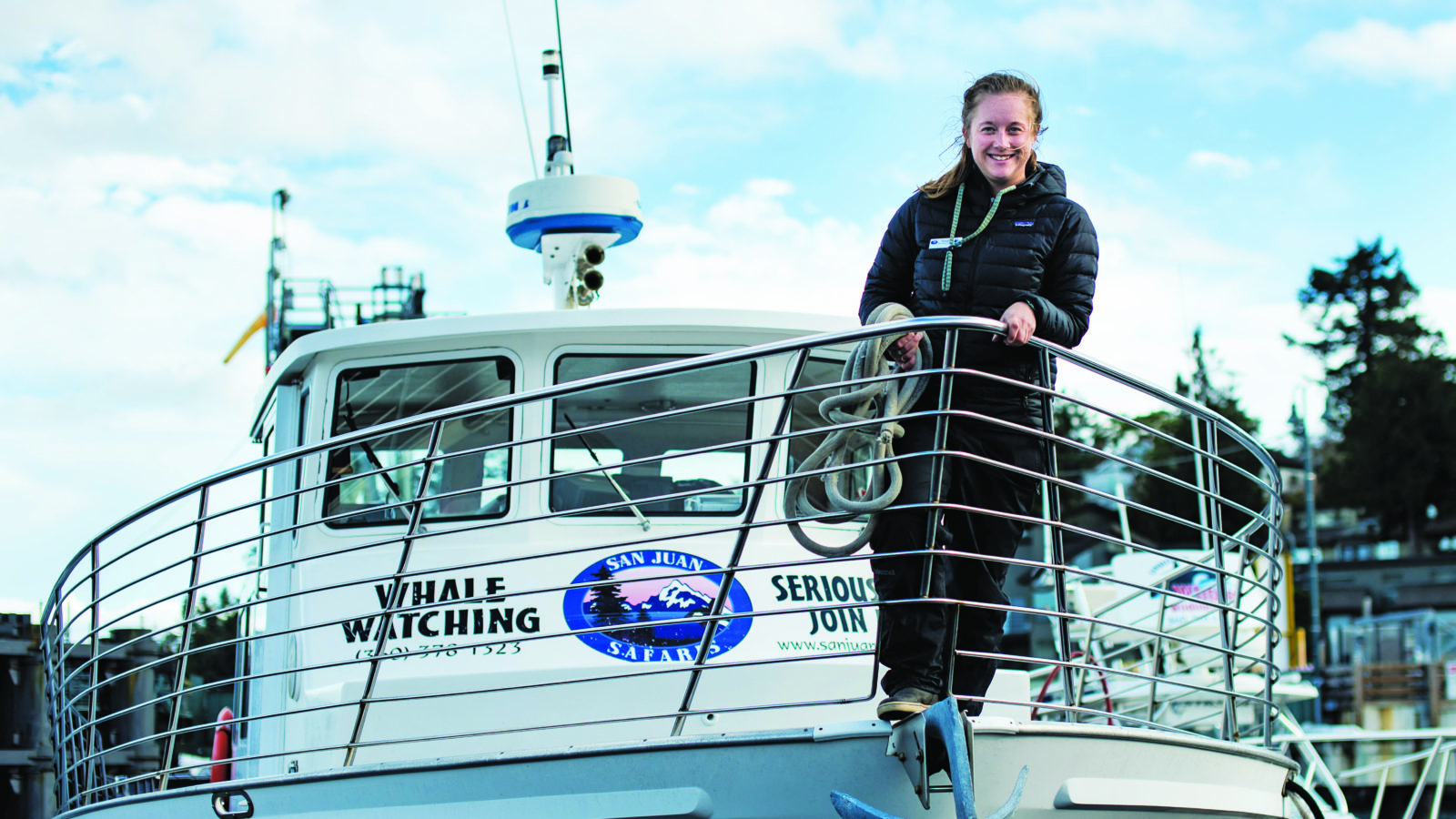Naturalist and boat captain Sarah McCullagh ’10 educates visitors about the orcas of the Pacific Northwest.
At the age of 3, Sarah McCullagh ’10 watched Free Willy, the 1993 film that introduced a generation of children to the power, intelligence, and social sophistication of orcas. Now, as a lead naturalist, vessel coordinator, and whale watch boat captain in Friday Harbor, Washington, she gets to witness those same remarkable qualities firsthand. “When you see orcas, it’s hard not to be excited,” says McCullagh, who earned her bachelor’s degree in wildlife and conservation biology from the University of New Hampshire before being hired for what she describes as her dream job with San Juan Outfitters in 2014. “And I don’t care who you are. I’ve had big burly guys just squealing. These are stunning animals.”
Which made this past summer all the more heartbreaking for McCullagh and the Pacific Northwest whale research community. Amid much anticipation, Tahlequah, a 20-year-old female in the Seattle area’s critically endangered Southern Resident orca group, gave birth to a calf, the first born to that group in three years. Then, roughly a half-hour later, the baby died. For the next 17 days, Tahlequah stayed with the body, pushing it to the surface and carrying it along with her, behavior that attracted international press attention. “It was truly horrible to see that mom and that baby,” recalls McCullagh, who along with other whale boat captains purposely avoided the whale, but still occasionally came across her. At the same time, to researchers, the mother whale’s actions raised profound questions about the nature of animal grief.
“For a long time, biologists have been discouraged from using anthropocentric terminology to describe orcas and their behavior. How can we know that they are grieving? How can we know they are happy? How can we know that they are experiencing any of these emotions? And today we find ourselves in this very interesting position. To accurately describe their biology, we actually need to delve into those emotions. It may not be something that we are comfortable with, or that we know for sure, but there’s no other way to describe that behavior.”
Seen more broadly, the death of Tahlequah’s baby reflects a greater tragedy unfolding in the waters around Seattle and the San Juan islands, an area known as the Salish Sea. The Southern Resident orcas—a population composed of three extended families with a specific food preference, language, and social structure—live exclusively on salmon, a prey in decline from dams, pollution, and overfishing. “These whales need fish and there’s none of that for them,” McCullagh says. “They are working harder and harder to find that fish and getting skinnier and skinnier by the day.”
At present, the Southern Residents have just 74 members left, and last year two others died. “Watching these whales and getting to know them really as individuals—I mean, I talk about them like they are my nieces and nephews—and knowing that they are not doing well, it’s hard,” McCullagh acknowledges. “But I know that I am doing as much as I possibly can to help them by educating people. If I have even three people off one of my boats talk to someone else about the Southern Residents and the plight of the salmon, that has a huge rippling effect. Education is really the gateway to conservation.”
One of McCullagh’s early inspirations for appreciating nature and the outdoors was her mother, Williston math teacher Martha McCullagh (her father, Chuck, is the school’s Chief Financial Officer). “My mom was always the one saying, ‘Get outside!’” she recalls. Every summer we would camp with her for one to two weeks. I learned everything from trailering boats to roasting marshmallows to building fires, from her. We weren’t an inside family. That was the expectation and she set that for us.”
Amid the sadness of the orca story, McCullagh has also been witness to a reason for hope. In recent years, her area has seen the return of humpback whales, a species that McCullagh studied off Maui several years ago when she spent six months working with the Pacific Whale Foundation. Once considered commercially extinct, humpbacks have recovered thanks to legislation and other protections, she says, “and now we think there may be as many as 26,000 in the North Pacific. They have been a conservation success story.” Her first season on the water, McCullagh says, she saw perhaps five or six different humpbacks. This year, her boats saw more than 40.
From this, she draws a lesson for the orcas. “Any voices that these whales can get right now are important,” she says. “That’s where I’m at. They need as many advocates as they can possibly get.”
For more stories about Williston Northampton School alumni, click here.

